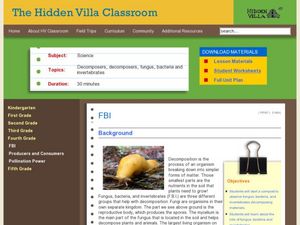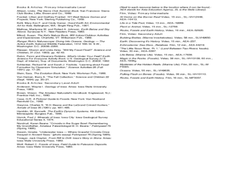Curated OER
Seashore Invertebrates
A colorful word search that features seashore invertebrates is here for you. Each of the 20 creatures has an accurate and colorful picture associated with it. There is an answer key as well. A good resource to supplement any unit of...
Curated OER
Common Pond Plants and Invertebrates
Here is a wordsearch that has learners find 18 different organisms that are commonly-found in pond environments. The monarch butterfly, cotton grass, water flea, and the damesfly are just a few of the organisms found. Colorful and...
Alabama Learning Exchange
Vertebrates or Invertebrates
Examine the differences between vertebrates and invertebrates as learners conduct Internet research, take an online invertebrate quiz, complete a vertebrate fact sheet, print out pictures of invertebrates they find interesting, and...
Curated OER
Invertebrates, No Backbone, No Problem
Third graders research an invertebrate, create a poster about it, then present it to the class.
Curated OER
Hunting Invertebrate Fossils in the Classroom
Students acquire a general knowledge of fossils and paleontology, the study of evidence of life in the past and identify the major invertebrate groups (phyla) commonly found in the fossil record.
Curated OER
Invertebrate Vocabulary-- Marine Invertebrate Match
In this science worksheet, students study 12 vocabulary words which pertain to marine invertebrates. Students read the definitions which include pronunciation, part of speech and meaning of the name. Students then look at 16 organisms...
Curated OER
The Five Classes of Vertebrates
What a terrific lesson! Learners discuss the animal kingdom, and classify them as vertebrates and invertebrates. They also identify them as fish, amphibians, reptiles, birds, and mammals. There is even a taxonomic breakdown of popular...
Curated OER
So You Think You're Tough
Fourth graders learn how to classify animals. In this invertebrates lesson, 4th graders discuss how we classify thinks into groups and move into a discussion about classifying animals. Students learn about the differences between...
Curated OER
Invent an Invertebrate
Design a new organism with recyclable art materials! After learning about the coastal biome, learners brainstorm challenges that a plant or animal may face. They use their ideas to create a creature, complete with environmental...
Curated OER
FBI
Fourth graders experiment with compost. In this Science lesson, 4th graders begin a worm compost as well as an outdoor compost. Students discuss decomposition.
Larson Lab
Animal Classification
How are animals classified? Scholars explore animal classification by observing non-living and living specimens. They learn how to organize animals into vertebrates and invertebrates and identify the five vertebrate groups: mammals,...
Curated OER
Microfishing
Learners use a simple method to collect living microorganisms from natural and/or artificial environments and develop skills in microscopy, observation, drawing, speculation, hypothesizing, oral presentation, and raising questions.
Curated OER
Through the Eyes of an Owl
Students describe vertebrates in terms of observable body parts and characteristics and describe life cycles of familiar organisms. They identify familiar organisms as part of a food chain or food web and describe their feeding...
Curated OER
Animals, Soil, Trees
Fourth graders describe the various kinds of soils and how plants and animals are affected by them. They describe the baic needs of plants, scoring at least a 3 or 4 on a 4-point rubic. Students are able to predict and/or infer what...
Curated OER
What is Soil?
Students examine soil. In this earth science lesson, students define and describe weathering and erosion as it relates to soil. Students compare and contrast potting soil with forest soil and complete a science observation worksheet.
NOAA
Importance of Deep-Sea Ecosystems – Chemists with No Backbones
Marine invertebrates offer us many new options for developing pharmaceutical drugs, such as w-conotoxin MVIIA, which is extracted from the cone snail and is a potent painkiller. The lesson encourages scholars to research various types of...
Curated OER
An Episode on Australian Animals
Fifth graders identify and analyze various ecological regions of Australia in order to identify more about some of the animals that inhabit the area. Students record information they discover on a chart provided that is assessed at end...
Curated OER
Fossil Kit II
Youngsters examine four fossil replicas and chart their time periods, vertebrate or invertebrate, and the names of other organisms living at the same time. A specific fossil kit is available for sale if you do not have the same samples....
NOAA
Understanding Food Chains and Food Webs
Jump into an exploration of marine ecosystems with the first lesson in this four-part series. After first learning about crustaceans, mollusks, and other forms of sea life, young marine biologists view a PowerPoint presentation that...
Habits of Mind
Haileybury Habits of Mind Learning Resource Book
Imagine a learning community committed to using Costa and Kallick's Habits of Mind as the basis of curriculum design. The resource book is packed with lessons that are designed for and identify the standards and habits of mind targeted...
Curated OER
Backyard Critters
Students explore the characteristics of invertebrates in their backyards. They observe, describe, and classify specimens. They conclude with a "snail race."
Curated OER
Animal Classification
Third graders differentiate between vertebrates and invertebrates, and identify the main characteristics of mammals, fish, reptiles, amphibians, and birds. They sort and categorize different types of balls, discuss the characteristics...
Curated OER
Crinoids: Flowers f the Iowa Seas
Learners study the rocks and fossils associated with the geologic landscape of Iowa. In this rocks and fossils lesson, students examine fossils that would be found in the Iowa landscape that show evidence of marine invertebrates such as...
University of Minnesota
Manduca sexta: Caterpillar Dissection
Caterpillars have an amazing, yet tough job to perform in their short lives — eat much, avoid predators, and try not to let all those comments about being the unattractive stage of the life cycle get to them. How do they handle it all?...
Other popular searches
- Invertebrates and Vertebrates
- Marine Invertebrates
- Invertebrates Vertebrates
- Vertebrates an Invertebrates
- Vertebrate and Invertebrates
- Benthic Invertebrates
- Invertebrates Research
- Invertebrates + Vertebrates
- Macro Invertebrates
- Estuary Invertebrates
- Macro Invertebrates
- Bentham Invertebrates

























